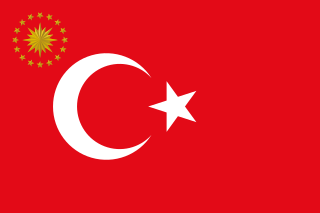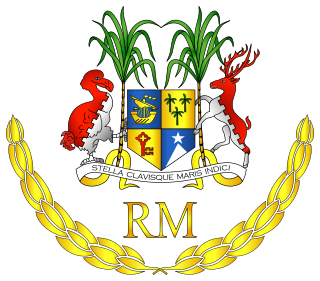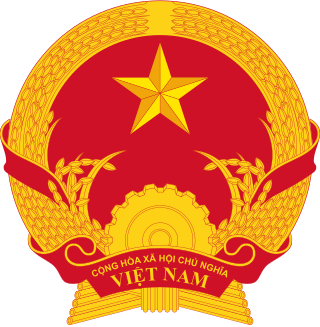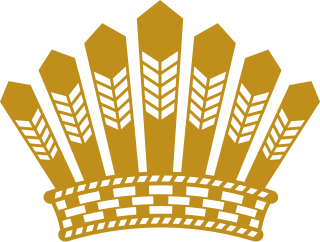Related Research Articles
A head of state is the public persona of a state or sovereign state. The specific naming of the head of state depends on the country's form of government and separation of powers; the head of state may be a ceremonial figurehead or concurrently the head of government and more.

The president of France, officially the president of the French Republic, is the executive head of state of France, and the commander-in-chief of the French Armed Forces. As the presidency is the supreme magistracy of the country, the position is the highest office in France. The powers, functions and duties of prior presidential offices, in addition to their relation with the prime minister and government of France, have over time differed with the various constitutional documents since the Second Republic.

Article Two of the United States Constitution establishes the executive branch of the federal government, which carries out and enforces federal laws. Article Two vests the power of the executive branch in the office of the President of the United States, lays out the procedures for electing and removing the President, and establishes the President's powers and responsibilities.

The president of India is the head of state of the Republic of India. The president is the nominal head of the executive, the first citizen of the country, as well as the supreme commander of the Indian Armed Forces. Droupadi Murmu is the 15th and current president, having taken office from 25 July 2022.

The president of Turkey, officially the president of the Republic of Türkiye, is the head of state and head of government of Turkey. The president directs the executive branch of the national government and is the commander-in-chief of the Turkish military. The president also heads the National Security Council.
A presidency is an administration or the executive, the collective administrative and governmental entity that exists around an office of president of a state or nation. Although often the executive branch of government, and often personified by a single elected person who holds the office of "president", in practice, the presidency includes a much larger collective of people, such as chiefs of staff, advisers and other bureaucrats. Although often led by a single person, presidencies can also be of a collective nature, such as the presidency of the European Union is held on a rotating basis by the various national governments of the member states. Alternatively, the term presidency can also be applied to the governing authority of some churches, and may even refer to the holder of a non-governmental office of president in a corporation, business, charity, university, etc. or the institutional arrangement around them. For example, "the presidency of the Red Cross refused to support his idea." Rules and support to discourage vicarious liability leading to unnecessary pressure and the early termination of term have not been clarified. These may not be as yet supported by state let initiatives. Contributory liability and fraud may be the two most common ways to become removed from term of office and/or to prevent re-election.
A convention is an informal and uncodified tradition that is followed by the institutions of a state. In some states, notably those Commonwealth of Nations states that follow the Westminster system and whose political systems derive from British constitutional law, most government functions are guided by constitutional convention rather than by a formal written constitution. In these states, actual distribution of power may be markedly different from those the formal constitutional documents describe. In particular, the formal constitution often confers wide discretionary powers on the head of state that, in practice, are used only on the advice of the head of government, and in some cases not at all.

The President of the Republic of Mauritius is the head of state of the Republic of Mauritius. Mauritius is a parliamentary republic, and the president functions as a ceremonial figurehead, elected by the National Assembly as set out by the Constitution of Mauritius. The current office-holder is Prithvirajsing Roopun. He took the office on 2 December 2019. The president's official residence is the State House.

The prime minister of Pakistan is the head of government of the Islamic Republic of Pakistan. Executive authority is vested in the prime minister and his chosen cabinet, despite the president of Pakistan serving as the nominal head of executive. The prime minister is often the leader of the party or the coalition with a majority in the lower house of the Parliament of Pakistan, the National Assembly where he serves as Leader of the House. Prime minister holds office by virtue of their ability to command the confidence of the National Assembly. The prime minister is designated as the "chief executive of the Islamic Republic".

The President of the Socialist Republic of Vietnam is the head of state of Vietnam, elected by the National Assembly of Vietnam from its delegates. Since Vietnam is a one-party state, candidates for the post are nominated by the Central Committee of the Communist Party of Vietnam. The officeholder is generally considered to hold the second-highest position in the political system, practically after the General Secretary of the Communist Party of Vietnam. As head of state, the President represents Vietnam both domestically and internationally, and maintains the regular and coordinated operation and stability of the national government and safeguards the independence and territorial integrity of the country.

The president of Guyana is the head of state and the head of government of Guyana, as well as the commander-in-chief of the armed forces of the Republic, according to the Constitution of Guyana. The president is also the chancellor of the Orders of Guyana. Concurrent with their constitutional role as Commander-in-Chief of the Armed Forces, the president does not appoint a separate Minister of Defence. That portfolio is held by the president who fulfils all responsibilities designated to a minister of defence under the Defence Act.

The vice president of India is the deputy to the head of state of the Republic of India, i.e. the president of India. The office of vice president is the second-highest constitutional office after the president and ranks second in the order of precedence and first in the line of succession to the presidency. The vice president is also the ex officio chairman of the Rajya Sabha.
An indirect election or hierarchical voting, is an election in which voters do not choose directly among candidates or parties for an office, but elect people who in turn choose candidates or parties. It is one of the oldest forms of elections and is used by many countries for heads of state, cabinets, heads of government, and/or upper houses. It is also used for some supranational legislatures.

Since its establishment in 1947, Pakistan has had a non-symmetric federal government and is a federal parliamentary democratic republic. At the national level, the people of Pakistan elect a bicameral legislature, the Parliament of Pakistan. The parliament consists of a lower house called the National Assembly, which is elected directly via first-past-the-post voting, and an upper house called the Senate, whose members are chosen by elected provincial legislators. The head of government, the Prime Minister, is elected by the majority members of the National Assembly and the head of state, the President, is elected by the Electoral College, which consists of both houses of Parliament together with the four provincial assemblies. In addition to the national parliament and the provincial assemblies, Pakistan also has more than five thousand elected local governments.

The government of Singapore is defined by the Constitution of the Republic of Singapore to consist of the President and the Executive. Executive authority of Singapore is vested in the President but exercised on the advice of the Cabinet led by the Prime Minister. The President, acting as the Head of State, may only act in their discretion in appointing the Prime Minister, acting as the Head of Government; as well as withholding consent for the dissolution of Parliament; along with performing key checks on the Government in addition to the ceremonial duties of the Head of State inherited from the Westminster system. The Cabinet, consisting of the Prime Minister and ministers appointed by the President on the Prime Minister's advice, is responsible for heading the Executive through ministries and other statutory boards. At the end of the term or at any time during the term, once the President has consented to a request made by the Prime Minister to dissolve Parliament, Parliamentary General Elections are held to elect members of Parliament for a new term. The President, in their discretion, then appoints a Prime Minister who is a member of Parliament representing any political party or coalition of political parties who in their judgement is likely to command the confidence of the majority of the members of Parliament. The Prime Minister then forms the Government and, along with the Cabinet, sets the general direction and control of the Government for the next term.

The president of Latvia is head of state and commander-in-chief of the National Armed Forces of the Republic of Latvia.

The president of Nepal is the head of state of Nepal and the commander-in-chief of the Nepalese Armed Forces.

The president-elect of the United States is the candidate who has presumptively won the United States presidential election and is awaiting inauguration to become the president. There is no explicit indication in the U.S. Constitution as to when that person actually becomes president-elect, although the Twentieth Amendment uses the term "president-elect", thereby giving the term constitutional basis. It is assumed the Congressional certification of votes cast by the Electoral College of the United States – occurring after the third day of January following the swearing-in of the new Congress, per provisions of the Twelfth Amendment – unambiguously confirms the successful candidate as the official "president-elect" under the U.S. Constitution. As an unofficial term, president-elect has been used by the media since at least the latter half of the 19th century and was in use by politicians since at least the 1790s. Politicians and the media have applied the term to the projected winner, even on election night, and very few who turned out to lose have been referred to as such.
The Philippine presidential line of succession defines who becomes or acts as president upon the incapacity, death, resignation, or removal from office of a sitting president or a president-elect.
References
- ↑ Consolidated version of the Treaty on European Union - TITLE III: PROVISIONS ON THE INSTITUTIONS - Article 17: The Council, by common accord with the President-elect, shall adopt the list of the other persons whom it proposes for appointment as members of the Commission.
- ↑ "Presidential Transition Act of 1963 (Public Law 88-277)". General Services Administration. Archived from the original on 22 October 2015. Retrieved 17 July 2019.
The terms "President-elect" and "Vice-President-elect" as used in this Act shall mean such persons as are the apparent successful candidates for the office of the President and Vice President, respectively, as ascertained by the Administrator following the general elections held to determine the electors of the President and Vice-President in accordance with title 3, United States code, sections 1 and 2.